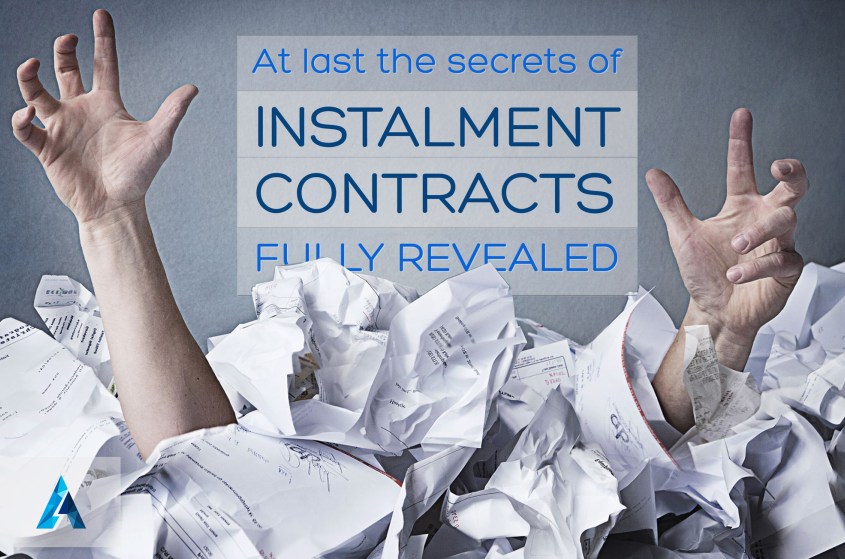At Last the Secrets of Installment Contracts Fully Revealed
INSTALMENT CONTRACTS GENERALLY First, what is an instalment contract? A secrets of instalment contract is a contract for the sale of land, and where applicable, including improvements (that is, the house etc) which provides that: The purchase price is to be paid by a series of instalments (which may or may not include the payment […]

At Last the Secrets of Installment Contracts Fully Revealed
INSTALMENT CONTRACTS GENERALLY
First, what is an instalment contract?
A secrets of instalment contract is a contract for the sale of land, and where applicable, including improvements (that is, the house etc) which provides that:
- The purchase price is to be paid by a series of instalments (which may or may not include the payment of a deposit);
- The Buyer is bound to make the payments;
- The Buyer is not entitled to receive a conveyance of the land until the final installments has been paid.
Installment Contracts for the purchase of houses in Queensland require diligent technical skill that can only be obtained from experience.
Are the rights and obligations of Buyers and Seller regulated?
The rights and obligations of Buyers and Sellers for instalment contracts in Queensland are regulated by the Property Law Act 1974 (“PLA”) and those provisions cannot be contracted out of.
What are the restrictions on the Seller?
The PLA restricts Sellers under instalment contracts from:
- Terminating the contract for a failure by the Buyer to pay an instalment until a notice has been served on the Buyer giving the Buyer thirty days to pay the outstanding instalment; and
- Mortgaging or selling the land after entry into an instalment contract without the consent of the Buyer.
_
Buyer’s right to lodge a caveat
The Buyer under an instalment contract may by the provisions of the PLA lodge a caveat preventing the Seller from dealing with the land in any way until the completion of the contract. The provisions of the PLA further deem the caveat to be non-lapsing.

Buyer’s right to require conveyance
Where a Buyer under an instalment contract:
- Is not in default under the contract;
- Has paid an amount equal to one-third of the purchase price;
- Has served upon the Seller notice in writing of the Buyers requirement,
The Buyer has the right to require a transfer of the property to the Buyer, with a mortgage to be granted back to the Seller.
Does the instalment contract have to comply with the Consumer Credit Code?
Depending on the circumstances of the Seller, the instalment contract may also be required to comply with the provisions of the consumer credit code as well as the PLA.
When is transfer duty payable?
An instalment contract is liable to transfer duty at the standard rates of duty payable by parties in usual conveyance transactions. This includes the principal place of residence and first principal place of residence rebates. The instalment contract will need to be lodged for assessment of transfer duty within one month from the date the instalment contract becomes unconditional. Transfer duty will then have to be paid within thirty days from the date the assessment notice issues.

OUR FORM OF INSTALMENT CONTRACT
Features
- Possession – The Buyer may occupy the house and live in it within up to sixty days after both the Seller and the Buyer sign the instalment contract while the Buyer is paying it off.
- Interest – Interest is charged on the outstanding amount of the purchase price and is calculated on a daily basis.
- Instalments and time to pay – The instalments are calculated on the basis of a principal interest loan amortised over 25-30 years. The instalments however are to be paid by a series of equal instalments over a term with a final lump sum payment being the balance of the purchase price payable when you have paid thirty percent of the purchase price (not including interest). At that time, you may need to organise a loan with a traditional financial institution.
- No bank or finance approval necessary – The Seller effectively provides the finance for you to purchase the house.
- The purchase price will not change – The purchase price is fixed when the instalment contract is signed and cannot change, regardless of any increase in the value of the property over the term that you are required to pay instalments.
- Due diligence – The Buyer has fourteen days in which to conduct a physical inspection of the property and to conduct searches and make other enquiries after the contract is signed. If the Buyer is not satisfied with the property during that period the Buyer may terminate the contract. Once the instalment contract is unconditional the Buyer is deemed to have accepted the property in its then “as is” condition.
- Outgoings – The Buyer is required to pay in addition to the instalments council rates, water rates, fire service levies, land tax (if applicable) and insurance premiums relating to the property.
- Early payout – The Buyer may by not less than thirty days notice payout early the purchase price. If the Buyer does so, any outstanding interest together with an early payout fee will also be payable.
_
Important obligations of the Buyer
- Paying instalments and outgoings – The instalments and outgoings are payable either weekly, fortnightly or monthly (depending on your arrangement with the Seller). The first instalment is due one week, fortnight or month (as the case may be) after the possession date. If you are late in making your payments, late payment charges apply including higher interest charges.
- Keep property in good condition – You must amongst other things at all times:
– keep the property in good repair and condition, carry out regular maintenance;
– insure the property is clean and fit for occupation;
– replace any part of the property that becomes worn out, non-operational, destroyed, lost or removed.
- Insurance – The Seller is to take out and maintain:
– adequate insurance over the property against destruction or damage for the replacement value of the improvements;
– public risk insurance for at least $20,000,000.00.
- Remaining in possession – The Buyer must remain in possession of the property (that is, cannot lease and or rent it to anyone or leave it unoccupied for a continuous period in excess of thirty days).
- No demolition etc – The Buyer must not demolish, remove or significantly modify the whole or any part of the house and any other improvements to the property.
_
Default by Buyer
- Instalment not paid in time – If an instalment is not paid on the due date for payment the Seller may give the Buyer a notice to remedy the default. If the Buyer does not then remedy the default the Seller may make the outstanding amount of the purchase price and any interest and outgoings owing immediately payable in full.
- What other defaults are there? – the Buyer will be in default under the instalment contract where the Buyer is in breach of any of the Buyer’s obligations as Buyer. Those defaults can also result in termination of the contract.
- What happens on termination of the instalment contract? – If a default has occurred and the Seller terminates the contract, the Buyer must vacate the property within seven (7) days from the date the Seller gives the Buyer notice to do so.
- What happens to the instalments paid? – The deposit and all instalments paid under the instalment contract are retained by the Seller if the contract is terminated as a result of the Buyer’s default.
- Who pays the default costs? – Any costs and expenses arising from the default which the Seller must pay are also payable by the Buyer.
WARNING
This information is intended to provide assistance to understand the procedures for the purchase of houses using instalment contracts in Queensland. It includes a summary of some of the features of instalment contracts generally and some of the provisions of the instalment contract document used by us. This information does not and should not be regarded as giving legal advice. The Seller and Buyer should at all times obtain and rely upon their own, independent legal advice on the terms and conditions of an instalment contract before they sign. It is the instalment contract ultimately signed between the Seller and Buyer that governs their sale and purchase relationship.

For more information on selling, buying and vendor finance please visit our Brisbane law news section.
To speak with an expert in the area, contact 1800 217 217 to arrange a consultation.
- Is The Bar Marginalising Mediators?
- How To Save Costs On Your Next Property Conveyancing
- Are The Legal Services Commission Taking You To QCAT?
Contact
United Service Club
Level 4, 183 Wickham Terrace, Brisbane QLD 4001
Free Call: 1800 217 217
Phone: 07 3236 0001
Fax: 07 3236 0005
Email: mail@aylwardgame.com.au







SHARE THIS